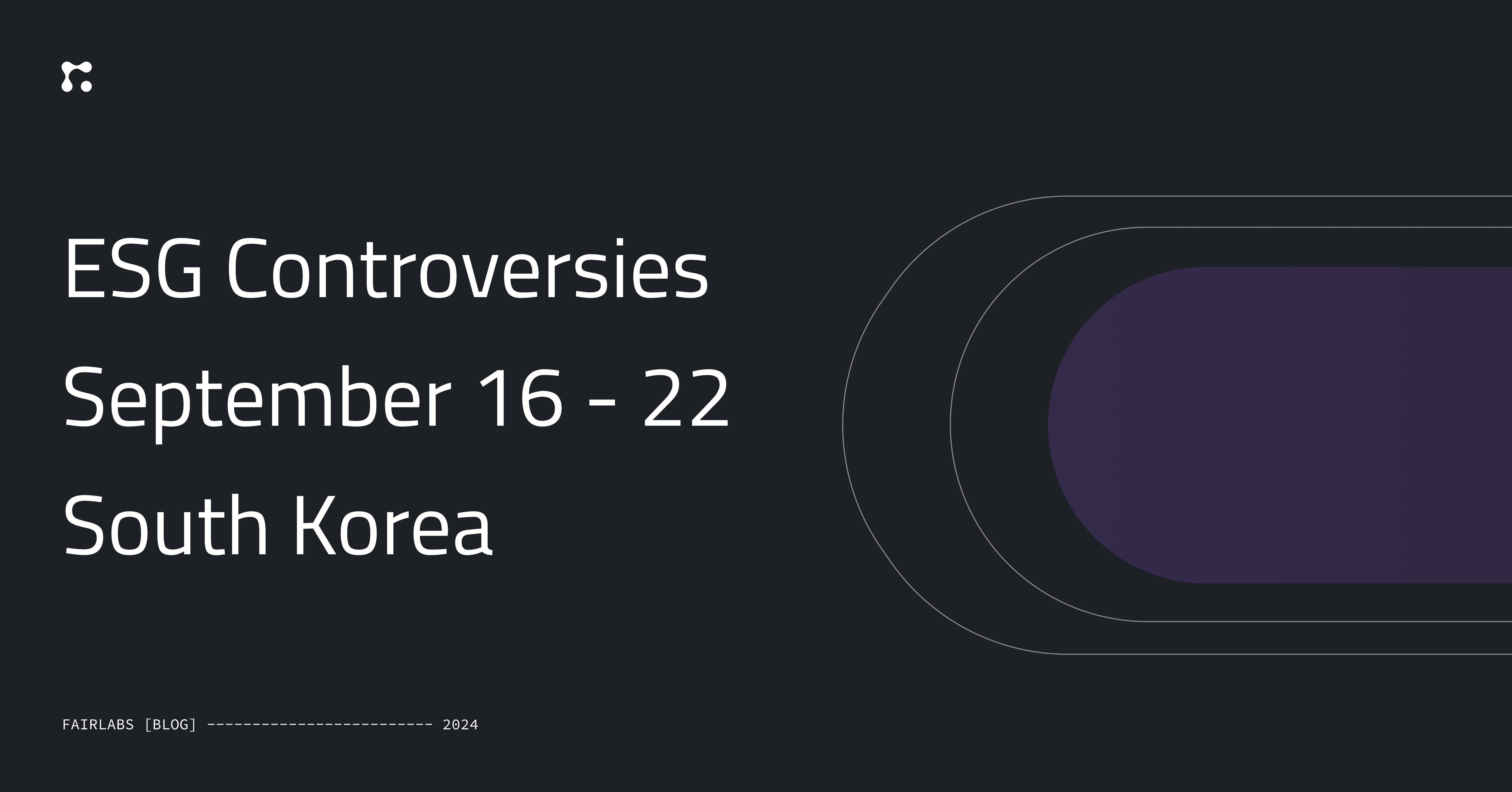Introduction
The purpose of this report is to analyze the attention and importance given to various Environmental, Social, and Governance (ESG) topics in Korean companies. By examining the exposure and stakeholder interest in specific ESG factors, we aim to identify the key themes that are currently driving discussions and shaping stakeholder values. This analysis is based on data from July 2022 to June 2023 and utilizes the Fairlabs’ Data API for 2,319 Korean companies listed on the Korea Exchange.
Methodology
To evaluate the importance of ESG topics, we used the Sustainability Accounting Standards Board (SASB) framework, which defines 26 ESG factors. The analysis focused on the exposure of articles related to these factors as a proxy for stakeholder interest. We employed Fairlabs' "ESG LENS" data point, which measures the exposure of articles associated with each ESG topic to gauge their significance. Additionally, we incorporated the Fairlabs Data API to assess the weighted exposure of ESG topics for each Korean company, ensuring a real-time and comprehensive evaluation.
Key Findings
Based on our analysis, the following ESG topics have garnered the highest stakeholder attention in Korean companies during the specified period:
- KR Universe: Top ESG Factors
The top three ESG topics that received the most attention across all listed Korean companies are as follows:
Business Ethics: This topic accounts for 33.1% of all articles in the trailing 12-month period. The emphasis on business ethics highlights the growing importance of ethical practices and transparency in corporate conduct. The issue of corporate ethics has garnered significant attention in Korea, notably in relation to the Deutsche Motors stock manipulation incident that stirred widespread discussion in financial circles.
Systemic Risk Management: Approximately 18.1% of the articles focused on systemic risk management, indicating a recognition of the need to proactively address risks that can affect the stability and sustainability of organizations.
Materials Sourcing & Efficiency: With a share of 13.3% of articles, materials sourcing and efficiency have gained considerable attention. This suggests a heightened focus on responsible sourcing practices and the efficient utilization of materials.
Moreover, the analysis revealed other notable ESG topics, such as Labor Practices, Competitive Behavior, and Product Quality & Safety, which received moderate attention.
SASB Categories with Highest TTM Negative Exposure on KR Universe

Source: Fairlabs
Top 10 Sectors by Exposure: Business Ethics
One way to understand topics receiving the most attention is to look at the exposure ratio related to a specific category at the sector level. Regarding the Business Ethics, the Consumer Goods sector receives the greatest negative exposure. SASB does not deem business ethics as a major concern in the consumer goods sector. However, recent data analytics have brought forth a renewed scrutiny of Business Ethics within this sector. A notable example is the Deutsche Motors stock manipulation incident, which has generated considerable stakeholder attention in South Korea.

- Consumer Goods Sector: Top Factors
When examining the Consumer Goods sector specifically, the following ESG topics emerged as the most prominent:
Product Quality & Safety: With a significant exposure ratio of 36.65%, this topic dominates discussions within the sector. The attention on product quality and safety likely stems from concerns regarding negative incidents and consumer well-being.
Materials Sourcing & Efficiency: This topic maintains the second highest negative exposure (25.23%) within the Consumer Goods sector. The impact of the Russian-Ukraine war on the global value chain appears to have amplified stakeholder interest in responsible materials sourcing and supply chain resilience.
Labor Practices: Garnering an exposure of 17.9%, labor practices also received considerable attention. This signifies a focus on fair treatment, worker welfare, and the promotion of ethical labor standards.
Other relevant topics in the Consumer Goods sector include Product Design & Lifecycle Management, Data Security, and Customer Privacy, although they garnered relatively lower exposure.
Highest Negative Exposure on Consumer Goods Sector based on SASB Materiality

Source: Fairlabs
Remarkably, a data analysis reveals the emergence of new topics in the consumer goods sector that were not previously considered significant issues by SASB, beyond their defined priority areas like Business Ethics and Systemic Risk Management.
Business Ethics: The recent series of stock manipulation incidents, including the case of Deutsche Motors, has highlighted the gravity of business ethics concerns as substantial risks within the industry.
Systemic Risk Management: Systemic risks associated with various factors, such as the COVID-19 pandemic, the Russia-Ukraine conflict, interest rate increases, and economic uncertainty, have significantly risen as risks for the consumer goods sector.
Highest Negative Exposure on Consumer Goods Sector based on Data Analytics

Source: Fairlabs
Conclusion
The evolving landscape of sustainable finance and AI-powered data analytic insights into the ESG topics show significant stakeholder attention in Korean companies based on SASB Standards. Business Ethics, Systemic Risk Management, and Materials Sourcing & Efficiency emerged as the most prominent ESG themes across all listed Korean companies. Additionally, within the Consumer Goods sector, Product Quality & Safety and Materials Sourcing & Efficiency were the primary focus areas. These findings underscore the importance of ethical conduct, risk management, product quality & safety, and responsible sourcing practices in the eyes of stakeholders. By staying informed about these key topics, businesses can align their strategies with stakeholder expectations and promote sustainable growth.
One intriguing finding from the data analysis is the dynamic nature of ESG Materiality, which varies not only based on industry characteristics but also across regions, countries, and time periods. This suggests that offering timely and empirically measurable quantitative data would be a powerful tool for identification of material sustainability-related risks and opportunities.
Latest Posts




